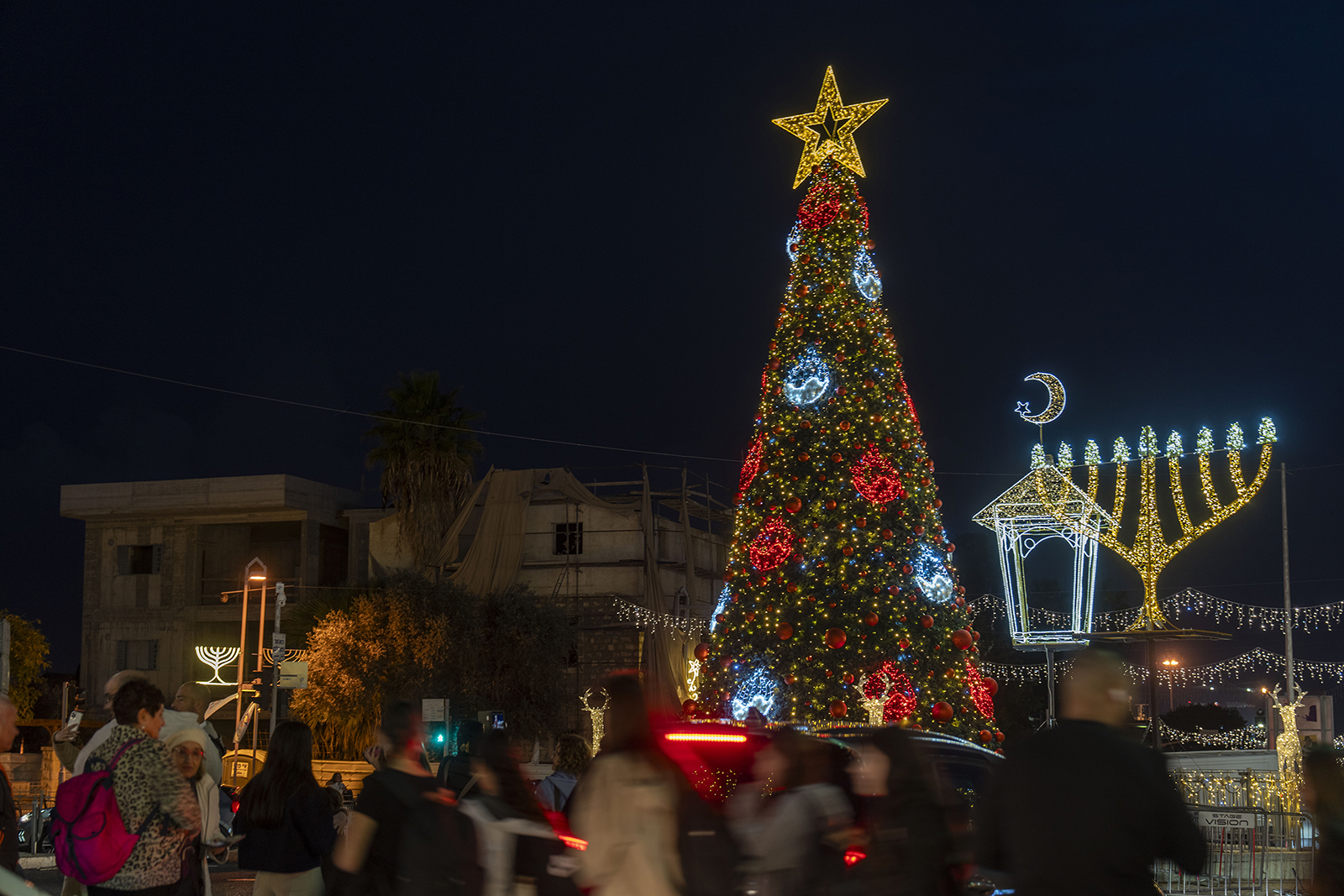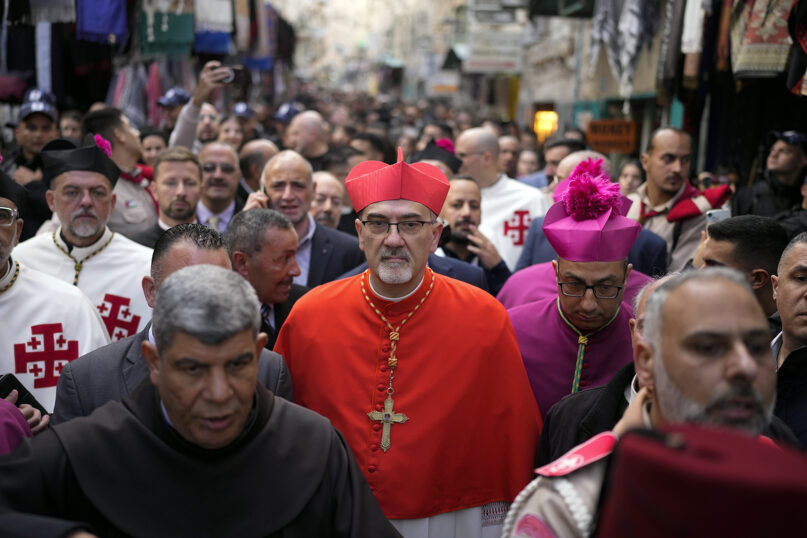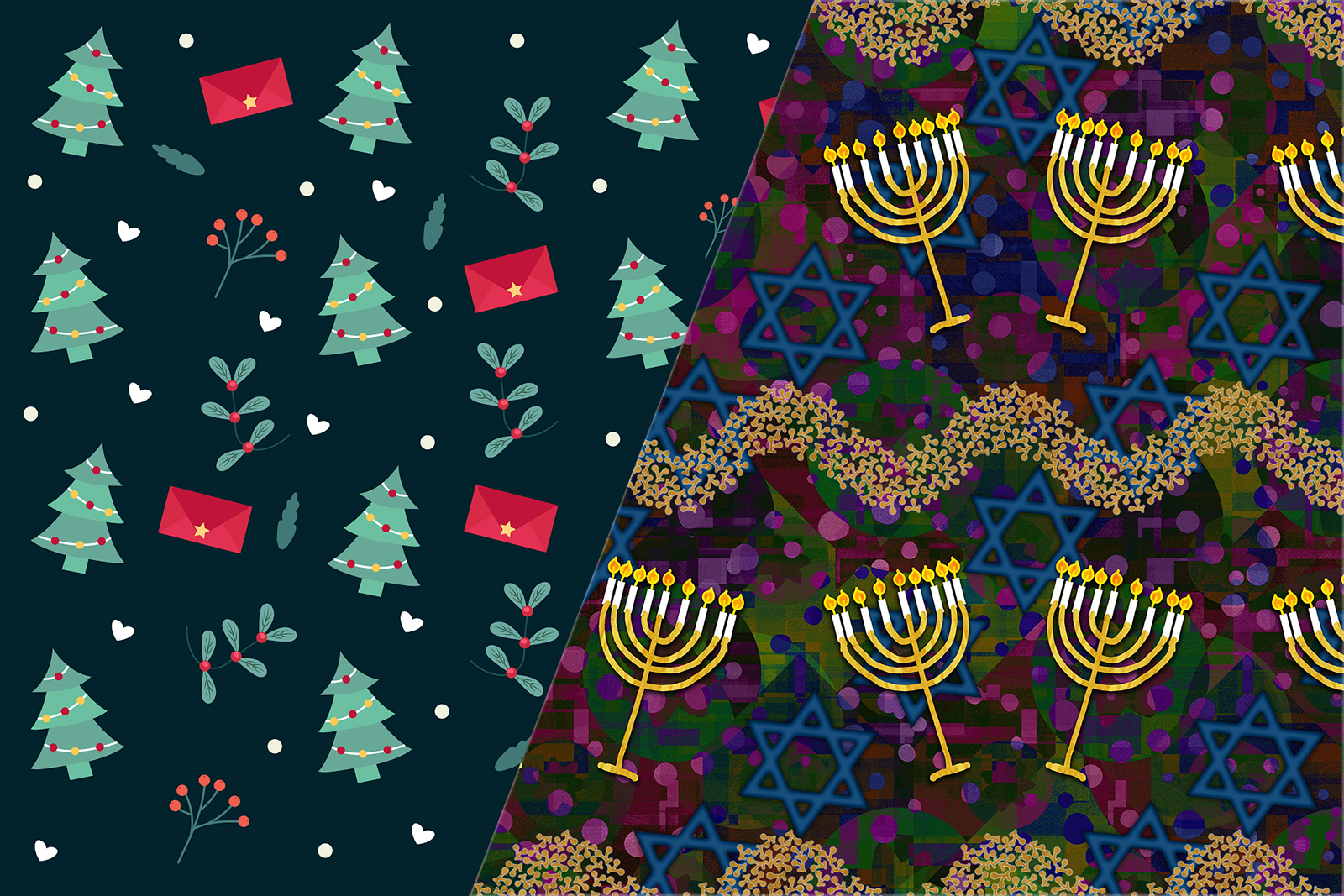JERUSALEM (RNS) — Gaza’s tiny Christian community prayed with Cardinal Pierbattista Pizzaballa, Latin Patriarch of Jerusalem, who received permission from Israel to visit the parish of the Holy Family in the embattled enclave.

Christian, Muslim and Jewish decorations are displayed in Haifa, Israel, Dec. 23, 2024. (AP Photo/Ariel Schalit)
Michele Chabin
December 24, 2024
JERUSALEM — Last year, Israelis marked Hanukkah and Christmas mostly quietly in their homes, synagogues, churches — and bomb shelters. Some 200,000 were displaced due to rocket fire from Gaza and Lebanon.
This holiday season, Israelis of all faiths are breathing a little easier, despite the country’s still-uncertain security, continuing displacement and the 100 hostages who remain captive by Hamas. The near absence of rocket fire from Gaza and Lebanon has meant that people are more open to congregating in public to light community Christmas trees, shop at outdoor holiday markets or attend a Hanukkah children’s festival.
In contrast to last year, Holy Land patriarchs and church leaders are again encouraging local Christians to publicly celebrate Christmas, provided they are “sensitive to the severe afflictions that millions in our region continue to endure.”
Although the decision to downplay Christmas last year was made “with good intentions,” the Christian leaders said in a November statement, “many around the world nevertheless misinterpreted this call to signify a ‘Cancellation of Christmas’ in the Holy Land — the very place of our Lord’s Holy Nativity.” Because of this, “our unique witness to the Christmas message of light emerging out of darkness (John 1:9) was diminished not only around the world, but also among our own people.”
Finding joy when Palestinians and Israelis are still dying in war “is extremely difficult,” acknowledged Maryam Khoury, a Christian from northern Israel who was visiting the Church of the Holy Sepulchre, believed to have been built over Jesus’ tomb, in Jerusalem. “But we can rejoice in Christ’s message of hope and love and provide hope and love to others.”
Rabbi Seth Farber, who leads the Kehilat Netivot synagogue in Ra’anana, said the onset of Hanukkah is especially bittersweet this year. “On one hand our community is feeling more optimistic,” he said. There are fewer air sirens, fewer military death notices and fewer local funerals. “On the other hand, the widows are still widows, the bereaved parents are still bereaved, and the children are still orphans.”
Although Hanukkah is a time of light and a celebration of heroism, “it is not possible to forget about the hostages and the nightmare they are living through,” Farber added. Recently, his synagogue celebrated the completion of a Torah scroll written in the memory of a young synagogue member killed on Oct. 7, 2023. “But we are not yet ready to have a Hanukkah celebration. The war and its aftermath are ever present in our prayers, and we continue to pray for the soldiers with an extra prayer every morning.”
Still, Hanukkah, like the other wartime holidays this year, must go on.
The synagogue will be holding an outdoor candle lighting each night of Hanukkah, with photos of the hostages placed near the menorah. “Hanukkah is about celebrating the miracle and publicizing it, but at present, alongside remembering the great moments of the past, we need to acknowledge the challenges of the present,” Farber said.
Hedva Fox, an educator, said she is striving to find positives this Hanukkah. “It seems that most of our history is made up of a dichotomy of both hope and despair — celebration and mourning. It’s okay to do both, to remember that you can celebrate and have hope for the future even if you also carry pain in your heart.
The plight of Palestinians in Gaza, coupled with the almost complete absence of Christian pilgrims and subsequent loss of income, has added to the grim mood in Bethlehem. For the second year in a row, the municipality decided to forgo outdoor Christmas decorations, festivals and festivities, including the annual Christmas tree lighting and open-air Christmas market.
“For us, Bethlehem is part of the Palestinian heritage, and as a result of what’s going on in Gaza, and Israel’s continuous attacks, we Christians will concentrate on Christian prayers and prayers for peace,” Anton Salman, mayor of the small West Bank city, told the National Catholic Register. “Of course, each person can celebrate Christmas in their way. But for the city itself, due to the situation, there will be no festivals or decorations. We want to show the world that Bethlehem and the Palestinian people are still suffering.”

Latin Patriarch Pierbattista Pizzaballa, the top Catholic clergyman in the Holy Land, center, arrives at the Church of the Nativity, traditionally believed to be the birthplace of Jesus, on Christmas Eve in the West Bank city of Bethlehem, Dec. 24, 2024. (AP Photo/Matias Delacroix)
In Gaza, the tiny Christian community was overjoyed this week to pray with Latin (Catholic) Patriarch of Jerusalem Cardinal Pierbattista Pizzaballa, who received permission from Israel to visit the parish of the Holy Family in the embattled enclave.
Before the war, about 1,000 Christians lived in Gaza. Since then, the community has dwindled as hundreds of members have received permission to emigrate. More than 20 have been killed during the war, according to the patriarchate. Their homes damaged or destroyed, the remaining Christians have taken refuge at two church compounds.
During the Mass, Pizzaballa, dressed in white vestments, presided over a confirmation ceremony for several of the community’s children.
In his homily, the patriarch praised the congregation’s fortitude and faith. “You are the light of our church. We are proud of you, not because of anything in particular, but because you have remained what you are: Christians with Jesus.
“Just as all the people of the world, not only Christians, are with you, so too you can give something to the world that looks at you, bringing the light of Christ to everyone with your example,” Pizzaballa said.
Merry Christmas or Happy Hanukkah? For some interfaith families, it’s both
(RNS) — Two Texas families share how they navigate honoring different religious heritages during the holiday season.

(Images courtesy of Pixabay/Creative Commons)
Marissa Greene
December 24, 2024
FORT WORTH, Texas (RNS) — When Ethan Klos, who was raised Jewish, and his wife, Ricki, a Christian, were ready to start a family, the Texas couple consulted a rabbi and a pastor about which religion to raise their kids in.
“Pick one,” the rabbi told the couple. “It doesn’t matter to me which one you pick.”
“So naturally,” recalled Ricki Klos, “that’s not what we did.”
The couple decided to raise their family in the Christian and Jewish faiths, alternating Sunday schools between temple and church.
Ethan and Ricki Klos represent the 17% of Americans whose spouse has a different religious affiliation than themselves, according to a 2024 Public Religion Research Institute study. This year, their commitments may be tested, as the first night of Hanukkah and Christmas Day will converge for the first time since 2005.
The Klos family has found different ways to honor both religious heritages in their Fort Worth home, where a collection of menorahs rests on a table and Star of David ornaments hang on the Christmas tree. “We’ll have Hanukkah decorations up all over the house, just as much as Christmas,” Ricki said.
The family will participate in the lighting of the candles and say prayers for Hanukkah. They will also read the Christmas story from the Bible, Ricki Klos said.
Interfaith couple Eric and Lauren Wessinger, who also live in Fort Worth, decided to raise their children, now teenagers, as Jews, celebrating Hanukkah as a religious holiday and Christmas as more of a cultural one, Lauren Wessinger said.
It was the best answer for both Eric, who grew up with a Jewish mother and a Christian father, and Lauren, who was raised without a specific faith but said her spirituality has been inspired by her mother, a convert to Tibetan Buddhism.
The family will light the menorah and attend Hanukkah holiday parties as well as have a Christmas tree at home.
The Wessingers said the holiday season can be a time to clear the air on misconceptions about what it means to observe both Christmas and Hanukkah — the notion, for instance, that their kids get twice the number of gifts for observing both holidays.
Being an interfaith family has also given Lauren Wessinger the opportunity to share about her family’s practices to curious friends or congregants, she said. “What I love is when people want to talk about it and ask what our traditions are, and they’re genuinely interested in families who do it differently,” Lauren said.
The Wessingers have also adopted mindfulness practices as a way to honor Lauren’s mother’s Buddhist faith and set intentions for the new year, by making vision boards or journaling.
“Even though we are doing Judaism more than anything, I still very much share the practice of mindfulness with the kids and the philosophies of Buddhism with them in the way that I lead our family and approach challenges and help them see difficulty through that lens,” Lauren Wessinger said.
Though they celebrate each holiday distinctly, the Wessingers cherish the shared days most of all. “It’s about being together in family time and the relationship piece of it,” her husband said. “Everyone’s always off for Christmas, so it’s just a good time to be together as a family, regardless of what your faith is.”
And though raising an interfaith family has not always been easy, Ricki Klos said, “I feel good that they’ve been exposed to two faiths, and they know two faiths very, very well. I don’t regret anything.”
Christmas and the first night of Hanukkah will realign again in 2035 and then in 2054, according to the Jewish calendar website Hebcal.
This article was produced as part of the RNS/Interfaith America Religion Journalism Fellowship.
(RNS) — Two Texas families share how they navigate honoring different religious heritages during the holiday season.

(Images courtesy of Pixabay/Creative Commons)
Marissa Greene
December 24, 2024
FORT WORTH, Texas (RNS) — When Ethan Klos, who was raised Jewish, and his wife, Ricki, a Christian, were ready to start a family, the Texas couple consulted a rabbi and a pastor about which religion to raise their kids in.
“Pick one,” the rabbi told the couple. “It doesn’t matter to me which one you pick.”
“So naturally,” recalled Ricki Klos, “that’s not what we did.”
The couple decided to raise their family in the Christian and Jewish faiths, alternating Sunday schools between temple and church.
Ethan and Ricki Klos represent the 17% of Americans whose spouse has a different religious affiliation than themselves, according to a 2024 Public Religion Research Institute study. This year, their commitments may be tested, as the first night of Hanukkah and Christmas Day will converge for the first time since 2005.
The Klos family has found different ways to honor both religious heritages in their Fort Worth home, where a collection of menorahs rests on a table and Star of David ornaments hang on the Christmas tree. “We’ll have Hanukkah decorations up all over the house, just as much as Christmas,” Ricki said.
The family will participate in the lighting of the candles and say prayers for Hanukkah. They will also read the Christmas story from the Bible, Ricki Klos said.
Interfaith couple Eric and Lauren Wessinger, who also live in Fort Worth, decided to raise their children, now teenagers, as Jews, celebrating Hanukkah as a religious holiday and Christmas as more of a cultural one, Lauren Wessinger said.
It was the best answer for both Eric, who grew up with a Jewish mother and a Christian father, and Lauren, who was raised without a specific faith but said her spirituality has been inspired by her mother, a convert to Tibetan Buddhism.
The family will light the menorah and attend Hanukkah holiday parties as well as have a Christmas tree at home.
The Wessingers said the holiday season can be a time to clear the air on misconceptions about what it means to observe both Christmas and Hanukkah — the notion, for instance, that their kids get twice the number of gifts for observing both holidays.
Being an interfaith family has also given Lauren Wessinger the opportunity to share about her family’s practices to curious friends or congregants, she said. “What I love is when people want to talk about it and ask what our traditions are, and they’re genuinely interested in families who do it differently,” Lauren said.
The Wessingers have also adopted mindfulness practices as a way to honor Lauren’s mother’s Buddhist faith and set intentions for the new year, by making vision boards or journaling.
“Even though we are doing Judaism more than anything, I still very much share the practice of mindfulness with the kids and the philosophies of Buddhism with them in the way that I lead our family and approach challenges and help them see difficulty through that lens,” Lauren Wessinger said.
Though they celebrate each holiday distinctly, the Wessingers cherish the shared days most of all. “It’s about being together in family time and the relationship piece of it,” her husband said. “Everyone’s always off for Christmas, so it’s just a good time to be together as a family, regardless of what your faith is.”
And though raising an interfaith family has not always been easy, Ricki Klos said, “I feel good that they’ve been exposed to two faiths, and they know two faiths very, very well. I don’t regret anything.”
Christmas and the first night of Hanukkah will realign again in 2035 and then in 2054, according to the Jewish calendar website Hebcal.
This article was produced as part of the RNS/Interfaith America Religion Journalism Fellowship.
No comments:
Post a Comment